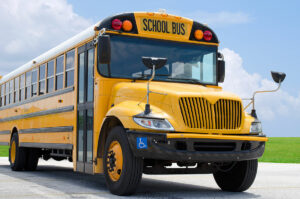It seems almost too soon to mention the “s-c-h-o-o-l” word. Still, quicker than you can imagine, your grandchild will be figuring out who is in their homeroom and talking about packing school supplies. When raising a loved one’s child, it’s good to consider what else you can do to get that child ready for school after notebooks, crayons, and graphing calculators are stuffed in backpacks.
The Worries You Might Have About School
In most respects, the beginning of a new school year for your grandchild (or cousin or nephew) is no different than it would be for your biological kids. You buy the same school supplies and sneakers that fit. You take the obligatory “First day of school” pictures and send them off with a kiss and a prayer. But living with you, whether you are related or a close family friend, can add layers of complication to this child’s school experience.
Here’s what we mean.
 Maybe your family is multi-generational, mixed race, or the child’s race/ethnicity is different than yours – and you worry they will have to field questions about your family.
Maybe your family is multi-generational, mixed race, or the child’s race/ethnicity is different than yours – and you worry they will have to field questions about your family.- Your grandchildren might have a large, extended birth family actively involved in their lives, and you wonder if their teachers will need a cheat sheet card to know who is who.
- Your grandchild came to you with the emotional scars and behaviors of a hard life, and you wonder how much of that information to share with her teacher.
- Johnny has learning differences and disabilities caused by prenatal alcohol or drug exposure, and you are concerned about his ability to succeed in school.
- You may be concerned that Suzy is slightly fuzzy about privacy and secrecy. She tends to overshare information that she may later regret telling her peers.
These concerns, and many others like them, can set you up for fear and uncertainty about your grandchild’s school experiences and the partnership between you and their school. It’s common for kinship caregivers like you to start a school year with a negative feeling about how this will go – for you and the child. Additionally, you don’t want to put the responsibility for a great start to the school year solely on the child’s shoulders. Nor do you want to overshare with their teachers. However, it is also wise to think about how to act now to prevent any potential problems.
A Quick Checklist to Prepare for Back to School
There are a few practical things you can do to help your grandchildren, and their teachers prepare for a great start to the school year.
- If your grandchild is likely to stand out from their peers at school (race, ethnicity, etc.), try to prepare them to answer questions from other children. Talk with them in age-appropriate ways about why your family doesn’t “match” or why they are new to the school district this year.
- Share information about your grandchild’s circumstances that will be necessary for the teachers and administrators to help adequately meet the child’s needs in the classroom. It is usually optional to share intensely personal details with the school.
- When your grandchild is transferring to a new school because they live with you now, consider the transcripts and records from their previous school. Are there learning challenges documented in those files? What learning services did the child receive at their other school? How will you start those services anew? Does the child need to be evaluated for more accurate and appropriate services?
- If you are concerned about specific behaviors you’ve observed in your grandchild, consider talking with the school counselor in addition to the teacher. Brainstorm ways to help the child, ask for local resources that might support your family, and request consistent, open lines of communication between home and school.
- If your grandchild freely shares details about your family’s circumstances (for example, Mom is in prison or Dad is in rehab again), consider whether they are oversharing details they may regret later. Some kids need help to understand the difference between privacy and secrecy.
- Ask your grandchild’s teacher about upcoming school assignments that might be problematic for the child. Some examples of these projects include creating a family tree, bringing baby pictures, or sharing firsts (first steps, first word, etc.).
- Consider what legal documents you may need to enroll the child in school. What safe numbers should you teach the child in case of emergencies? What contact information is appropriate for you and the child’s parents to share with the school? When raising grandchildren outside the umbrella of formal social services or child welfare, these questions might not apply to you. However, it’s still valuable to consider what protections and plans you should put in place for communication between home and school.
For more on the topics of setting kids up for success when they are heading back to school, listen to this podcast.
Take it One Step at a Time.
These checklist items might feel overwhelming, especially if you’ve not been involved in a school setting for a long time. Please don’t be anxious about it. Instead, talk with the school staff as early as possible. Even if your grandchild has been in this building or school district for a while, carefully walking through these steps will prepare you and your grandchild for the best start of the year possible!
